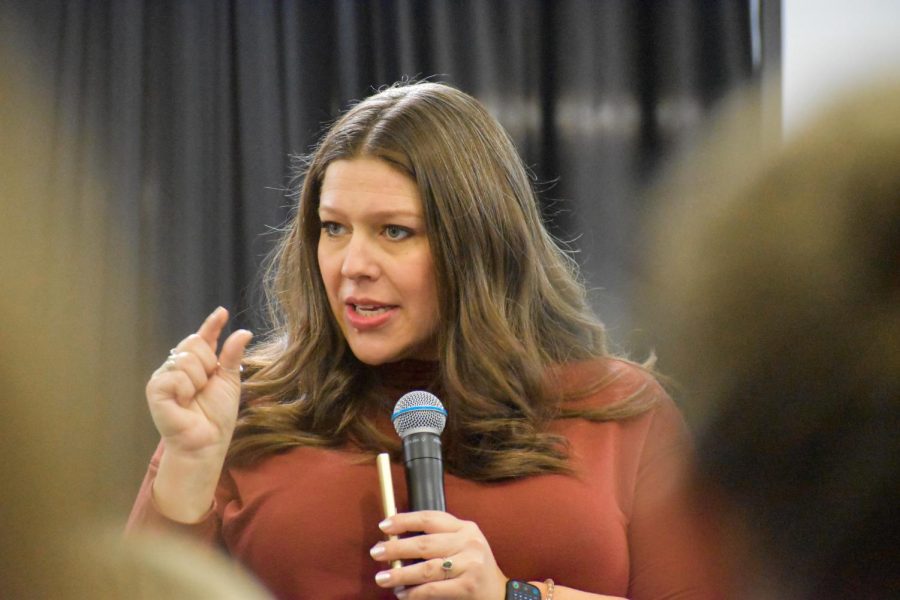The Audacity: Taking Up your Space in the World
Tina VanSteenbergen Robilotta is a professional public speaker who travels to colleges and other locations to speak about feminism and other women‘s issues. Robilotta gave her speech “The Audacity: Taking up your Space in the World” at Winona State on March 21.
March 29, 2023
Although women’s rights have come a long way since the women’s rights movement in the 1960s and 70s, many women still feel stifled in many of their environments, whether the environment is professional, educational or even personal. Women are often inherently taught to not “take up too much space” in professional settings, especially if those settings are predominately taken up by men.
Tina VanSteenbergen Robilotta, a professional speaker with a “passion and a purpose for working with women,” as her website states, visited Winona State University last Tuesday, March 21, to discuss taking up space as a woman or non-binary person in her speaker event called “The Audacity: Taking up your Space in the World”. The event was sponsored by the WSU Panhellenic Association, as VanSteenbergen Robilotta is working to make sororities more inclusive for all women and feminine-presenting people.
Throughout the talk, audience members were encouraged to speak to each other (and not just to their friends) about the ways in which they may be subconsciously taking up less space than they deserve. This created a vulnerable but safe environment for people to discuss with someone they may have never talked to before the ways they may be stifling their own presence.
Jessica Weis, a public relations major and a women, gender and sexuality studies (WGSS) minor discussed that VanSteenbergen Robilotta’s talk mirrored a lot of Weis’ WGSS classes, as it focused highly on the patriarchal society women and femme-presenting people are placed in.
“[Robilotta] shared that although we cannot dismantle the system we are currently in, we can slowly push the boundaries to make the world more comfortable for ourselves,” Weis stated.
Women are often stated to be more “emotional” beings than men in the eyes of misogynistic individuals and groups. Because of the “emotional” label being placed as a stereotype on women beginning very early on in their lives, women are often hesitant to speak up about their personal opinions or feelings on a given subject in various settings.
Robilotta directly challenged this, saying that women should not only share their feelings in whichever settings they find themselves in, but to acknowledge and trust them as they come. Suppressing feelings for the sake of “not taking up too much space” in a given area is not challenging the box that women are often placed in.
“Tina spoke about the common act of pushing our thoughts and feelings down in order to make others feel comfortable,” Weis said. “We have to be true to ourselves–if our gut tells us something, we have to respect our emotions and not push them away.”
Jordan Becvar, a third-year psychology major, commented on an analogy Robilotta discussed regarding women “taking up too much space” in the workplace, classroom or personal settings.
“Tina had said something about how nobody looks at a mountain and says it’s needy and is too ‘blank’; we say it’s beautiful, and as women, we deserve to take up space too,” Becvar said.
Tina VanSteenbergen Robilotta participates in in-person and virtual keynotes, as well as full and half-day retreats, according to her website. As a professional speaker, she covers topics such as sisterhood in sororities, creating confidence, enhancing positive body image and understanding feminism. She is known to be bubbly, engaging, captivating and determined to incite a sense of confidence and action in her audiences.
“[Feminism] is often a dirty word in our culture,” Robilotta states on her website. “It’s been twisted to mean hating men, being angry, even hating other women. I couldn’t disagree more.”
Through her speeches at colleges and other locations, Tina VanSteenbergen Robilotta hopes to spark change in sororities and other groups of women by inciting a sense of action through the anger that arises in the many women who face patriarchal settings and situations regularly. This action will be seen in making sororities more inclusive and to “empower the goodness and value in one another” as women.
“We are far more empowered together than we can ever be alone,” Robilotta states on her website. “Together we can become better friends, better sisters, and better women.”



































